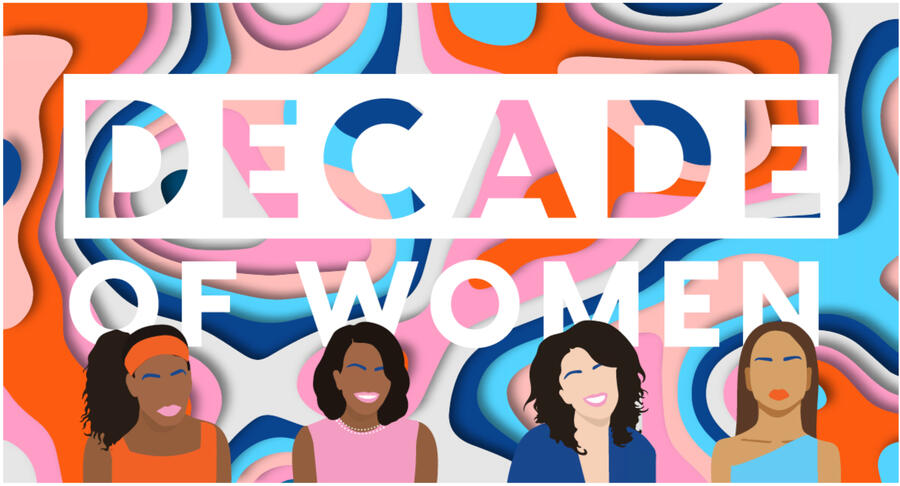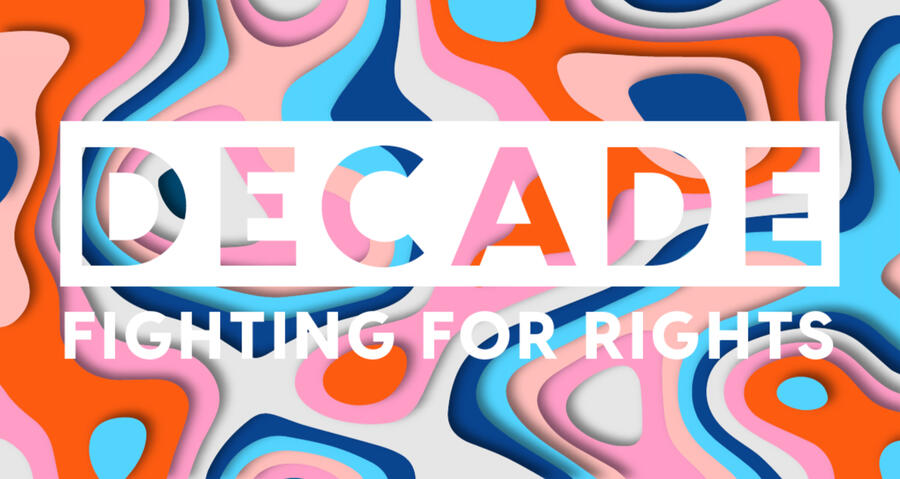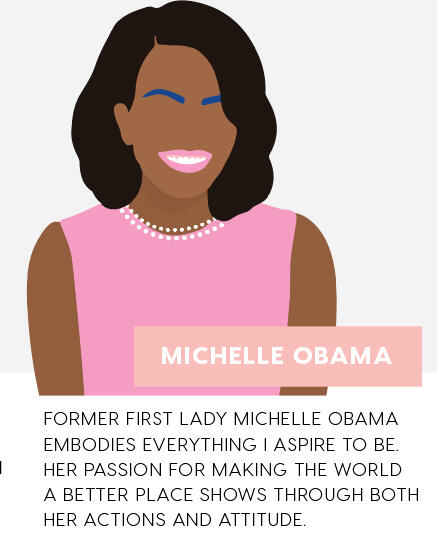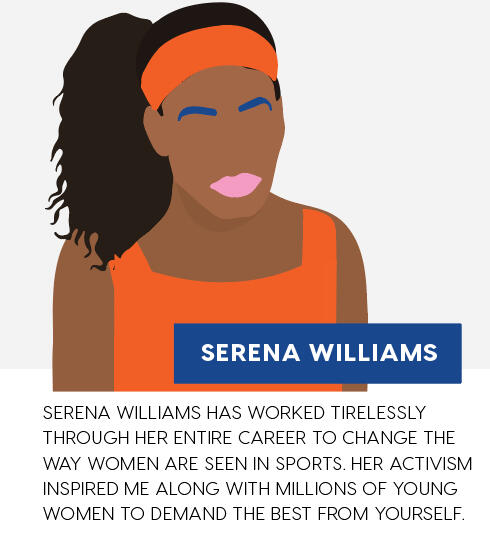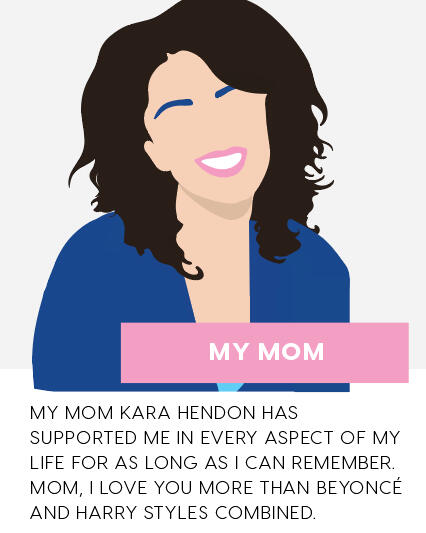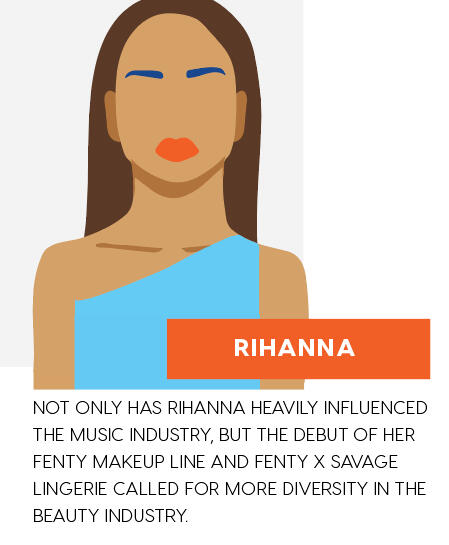
The past decade
A lot changed in the last 10 years — gay marriage was legalized, the line between reality and social media blurred and a movement of female empowerment began. Let's examine all that happened.
A Decade for women
I got my period the summer going into seventh grade and I’ve been slightly bitter ever since.
Not bitter in the way some boys like to insinuate girls are whenever they get “moody;” bitter because growing up as a girl means having to put up with things like periods, sexism and people who tell you none of these things are that bad.
A decade for women
Staffer reflects on the influence women have had on her personal growth in the past decade
Opinion by Phoebe Hendon
I got my period the summer going into seventh grade and I’ve been slightly bitter ever since.
Not bitter in the way some boys like to insinuate girls are whenever they get “moody;” bitter because growing up as a girl means having to put up with things like periods, sexism and people who tell you none of these things are that bad. Over the past decade, I’ve done a lot of growing up. With all the good and the bad — from travelling across oceans to dying my hair bright red — there’s no way I’d be where I am today without the influence women have had on my life.
The countless books I read all throughout elementary school with complex, independent female leads founded my values. The groundbreaking 2016 presidential election changed my life when I was in middle school and led me to an interest in politics. My trials and tribulations with mental health during high school and the subsequent support I’ve received from teachers and peers alike showed me that needing help doesn’t make you weak.
For a long time, I was convinced being a girl meant I’d drawn the short straw in life. But through women in pop culture, politics and my personal life, I’ve been proven wrong. To them, I owe everything.
We’ve been lucky enough to grow up in a generation where there’s a plethora of strong females to look up to, but their presence in Hollywood is still a relatively new development. Hermione Granger was my first ever hero, from the moment I first read about the curly-haired bookworm with a penchant for adventure. Katniss Everdeen and Tris Prior started rebellions. Wonder Woman and Captain Marvel refused to let anyone hold them back. Any badass girl with badass achievements had me hooked.
Though, with every heroine I found amid the pages of books I’d read over and over again, I couldn’t stay buried in fiction forever. Real women around the globe have started revolutions that have more impact on our world than any fictional escapade of mine. It’s the activists and rule-breakers who’ve been most influential on my growth as a young woman.
I started reading about women like Malala Yousafzai and Michelle Obama who were creating platforms for themselves to fight for issues they were passionate about. I saw in these women the same strength I saw in the fictional characters I grew up adoring. And almost instantly, I knew I wanted to be just like them — helping those who needed it the most in whatever way I could.
Women like director Ava Duvernay and Supreme Court Justice Ruth Bader Ginsburg who call out injustices in the world make me feel like I’m not confined to a life sentence of inferiority. But even so, there’s been moments where I’ve felt like all the work I’ve put in to establish a sense of security in myself has been completely useless.
During the 2016 presidential election, I heard a man who wanted to lead the entire nation brag about his ability to grab women by the you-know-what and sexualize his own daughter. I watched as no one around me seemed to care and thought the utopia of womanhood I’d dreamt of as a kid would never align with the reality in front of me. Looking back on it all now, I see how much I let men like this scare me. But throughout that election, I used the response of other women who worked twice as hard to combat this misogyny as a reminder that no one can dictate my worth — it’s completely up to me.
On the morning of November 7th, 2016, I woke up and immediately typed “election” into Google. I soon found out what had happened. I knew — but I couldn’t believe it. I’ve never told anyone before, but I cried on my bedroom floor that morning. I was 13 and had no idea what the next four years would look like. At that moment, I was scared. But the feeling didn’t last forever.
Whatever chip — or rather, brick — formed on my shoulder that day hasn’t left. I’m now shamelessly the girl who can manage to get into political debates in any room, the girl who uses Instagram to talk about issues most people scroll right past. I’m perfectly aware of it, but I don’t care. I’ve figured out that if I spend all my time thinking about what other people think of me instead of doing what fulfills me, I’ll miss out on the little things in my life that I wouldn’t trade for the world.
Dancing like a maniac in my kitchen to the music I love. Painting my nails different colors in my bedroom with Lorde on repeat. Studying for tests at Panera with my best friends and saving pretty pictures to the Pinterest boards we have for each other. Watching “To All The Boys I’ve Loved Before” with my mom and falling to pieces about how much we love Peter Kavinsky.
But it’s the bigger moments I can’t wait to tell my own daughter about someday. Canvassing for Sharice Davids to be one of my representatives and watching her become one of the first Native American women in Congress, along with a record-breaking number of females elected during 2018’s midterms. Training for months to finish my first 50-mile bike race and the feeling of sheer invincibility I had when I finished it. The pure joy I felt as a lifelong soccer nerd when Megan Rapinoe led the US Women’s National Team to win the 2019 Women’s World Cup.
Far too many women know what’s it like to feel small at the hands of those who say we don’t deserve to take up space. But whenever I’ve felt like no amount of my effort will render any impact on the world, I look to the women who refuse to be made inferior and use their persistence to show me how to make my own strides. I don’t know what highs and lows are in store for the 2020s, but I do know one thing — no one gets to tell me who I’m supposed to be.
A decade fighting for rights
Thanks to being born just in time for a life of acceptance, gay couple is thankful for the life they’ve been given despite struggling through discrimination and obstacles
Feature by Carolyn Popper
East parents Mary Chris Blickhan and Tami Greenburg knew there was no blueprint for their marriage ceremony.
Their marriage process had already gone atypically. In 2002, they exchanged rings in a church only accompanied by each other, the pastor and their one-year-old son, Ben. In 2014, they notified their closest friends to meet in Iowa, one of 32 states in which gay marriage was legal, for a quick wedding that would be held in the private room of a restaurant. They were back in Kansas City the next morning for their son’s soccer game.
Three months later, a friend organized a ceremonial wedding celebration at the Firestone building in downtown Kansas City. It was the closest thing to a wedding they’d had yet. Invitations were sent out, inscribed with Ghandi’s ‘What barrier is there that love cannot break?,’ Mary Chris and Tami wore white and the minister married his first ever gay couple.
“We have our marriage certificate framed on our office wall,” Tami said. “A lot of married couples don’t have that but we’re not taking this for granted.’”
They remember the amount of guests who approached them at their reception — saying how powerful the ceremony was. That there was a deepness to their marriage that doesn’t come from a couple of 25-year-olds. The minister told them even on his last day alive, he would remember their wedding.
But for most of their lives, Tami and Mary Chris were the first gay parents to do anything. When their now-senior son Ben was starting kindergarten, a Catholic school turned their family away for directly contradicting with Catholic teachings.
When Mary Chris and Tami were going through the second parent adoption — giving Mary Chris parental rights to their two kids, Ben and now-sophomore Alex, since Tami carried both biologically — the family court commissioner refused to hear their case. Had they come before the judge, he said he wouldn’t listen. Mary Chris, Tami and the family and friends who came along waited in the lobby as their attorney scrambled to find a judge who would listen.
“The world was different then, and I think that’s difficult for current Shawnee Mission East students to understand, that the world was so different not that long ago,” Mary Chris said.
Before they could go through with artificial insemination — birth by a sperm donor — a therapist had to approve and a doctor had to agree. It made them think what other parents had to be approved to start their family. It reminded them other parents didn’t need to go through half of the same steps.
In 2012, Tami switched jobs from a national organization to a local one whose health care company refused to provide it to a non-legalized married couple. After having stayed home with their two boys, Mary Chris went back to work solely for the purpose of acquiring health insurance for the family. Had they been a legally recognized married couple, insurance never would have been a problem.
“It was frustrating to be discriminated against in that way,” Mary Chris said. “Because other families didn’t have to deal with that problem because their marriages were legal. Ours, there was no way of making it legal.”
But they’ve never adopted a sense of victimhood around their relationship. Since they’ve felt overwhelmingly supported, they don’t give too much thought to the inconveniences — like avoiding saying the word ‘wife’ to strangers or pretending they were sisters on a family vacation to South Africa. They feel they stand as an example to humanize gay marriage to those who have only ever considered it a concept.
“Over the years there’s been a number of people who would hypothetically say something like, ‘We totally don’t support gay marriage, but we love Tami and Mary Chris.’” Tami said. “I think that’s what changes people’s minds in history, you get to know the people and they’re not much different than you.”
And they’re adamant about never having tried to change anybody’s opinion. They’re not militant, trying to live their lives and raise their children, in peaceful coexistence.
“I really do think our relationship has become more common in the last decade,” Mary Chris said. “But the most important thing about our lives is our boys.”
They put everything into raising their boys because in a two-mom household, there is nothing unintentional about bringing children into the family. No one gets accidentally pregnant in a gay family, Tami said. When they had their two boys, Mary Chris and Tami felt they had been a combination of brave and naive. They had no anticipation of all the problems that would come up but, neither does any parent, they reminded themselves.
“It’s been the best journey of our lives being parents together,” Mary Chris said.
In an attempt to be supportive, people had told the Tami and Mary Chris that it didn’t matter the boys wouldn’t have a dad. But according to Tami, it does matter. It matters because their family dynamic makes them who they are. Having a dad is not a requirement, nor necessarily a law. And she hopes Ben and Alex have benefitted by being in this family.
“We’re trying to do our best, like all parents are trying to do their best. It’s just more complicated in our family,” Tami said. “It’s different. It’d be wrong to not describe it as different, but it’s good.”
2010s Project Home Page
© Untitled. All rights reserved.
